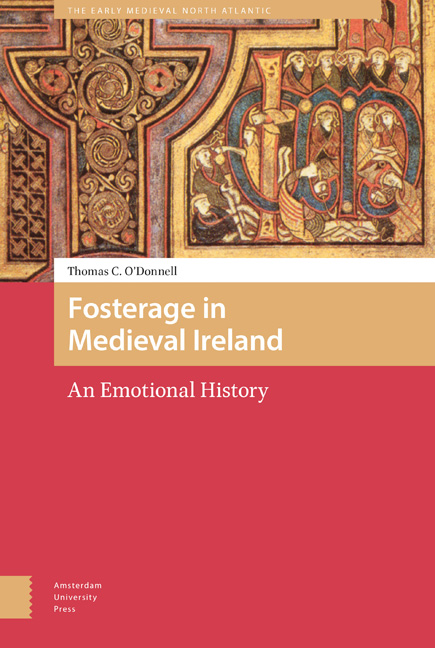Book contents
- Frontmatter
- Dedication
- Contents
- Abbreviations
- Acknowledgements
- Introduction
- 1 Cú Chulainn and Expressions of Foster Fatherhood
- 2 Who Makes a Foster Sibling?
- 3 Identity within Fosterage
- 4 Fosterage in the Medieval Irish Church
- 5 Animal Fosterage: A Bestial Parallel?
- Conclusion
- Bibliography
- About the Author
- Index
5 - Animal Fosterage: A Bestial Parallel?
Published online by Cambridge University Press: 25 November 2020
- Frontmatter
- Dedication
- Contents
- Abbreviations
- Acknowledgements
- Introduction
- 1 Cú Chulainn and Expressions of Foster Fatherhood
- 2 Who Makes a Foster Sibling?
- 3 Identity within Fosterage
- 4 Fosterage in the Medieval Irish Church
- 5 Animal Fosterage: A Bestial Parallel?
- Conclusion
- Bibliography
- About the Author
- Index
Summary
Abstract
Fosterage was used as a metaphor to describe relationships between humans and animals. This chapter takes the Life of Saint Ailbe as its central case study to trace how human and animal relationships were thought of and described in medieval Ireland. Ailbe is taken in as a child by a wolf in the wilderness and raised with her pups. Unlike other tales of this type, the relationship between Ailbe and the wolf continues after Ailbe is taken back to human society, modelled as it is on fosterage. This study highlights the permeable boundary between humans and animals and the use of fosterage as medieval tool for thinking.
Keywords: wolves, human animal relationships, bestiary, Ailbe, Romulus and Remus
Previous chapters have demonstrated that fosterage can be created outside the traditional legal bonds of the expected foster family. The language is pushed particularly far when Íte refers to the giant beetle eating her side as her dalta (fosterling). In this chapter I investigate just this kind of relationship; where fosterage is used to describe the close emotional bond between humans and animals. Tales of animals and humans tightly bound by shared emotions are, of course, common in the Middle Ages. As Bintley and Williams have recently commented, ‘[T]his was an age better acquainted and more comfortable than our own with shape-shifters, monsters, talking animals, and the repeating cycle of the agricultural year: the boundaries observed between humans and animals throughout much of the modern world would have been far less rigid to many in the early Middle Ages.’ It has often been said of medieval Irish literature, especially the hagiographical work, that it particularly values interactions between humans and animals. This is certainly a powerful perception, fuelled by the popularity of such famous poems as Messe ocus Pangur Bán. I do not wish to say that writers in Ireland were any more zoocentric than those in other European literatures, but they clearly used human/animal interactions in their thinking.
One of the things that these authors thought about with regard to animals was the foster relationship. Sometimes animals fed humans and that was as far as it went, but other times this was the beginning of an emotionally nuanced foster relationship.
- Type
- Chapter
- Information
- Fosterage in Medieval IrelandAn Emotional History, pp. 173 - 204Publisher: Amsterdam University PressPrint publication year: 2020



